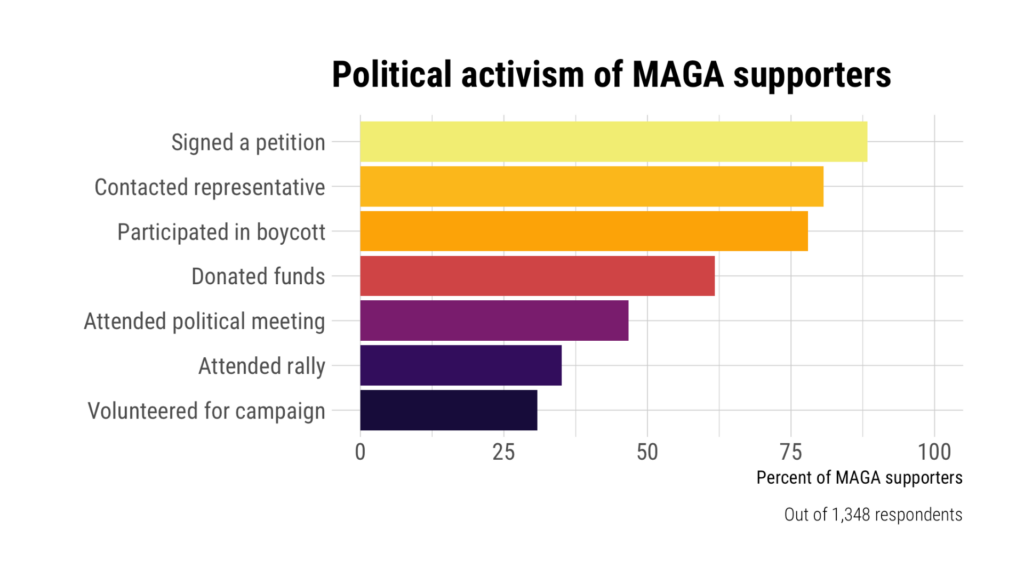Dr. Blum’s research focuses on party factions and their impact on contemporary US politics. Here’s a list of her recent publications and projects.
Books
- How the Tea Party Captured the GOP (University of Chicago Press), 2020.
- Cooperating Factions: A Network Analysis of Party Divisions in U.S. Presidential Nominations (with Hans Noel at Cambridge University Press), forthcoming.
Articles
- “Cross-Platform Partisan Positioning in Congressional Speech,” at Political Research Quarterly (with Jon Green, Kelsey Shoub, and Lindsey Cormack), 2024.
- “How Local Factions Pressure Parties: Activist Groups and Primary Contests in the Tea Party Era,” at the British Journal of Political Science (with Mike Cowburn), 2023.
- “Conditional Congressional communication: how elite speech varies across medium,” at Political Science Research Methods (with Lindsey Cormack and Kelsey Shoub), 2023.
- “Trump-ing Foreign Affairs: Status Threat and Foreign Policy Preferences on the Right”, at Perspectives on Politics (with Christopher Parker), 2019.
- “Student-run exit polls 101,” at PS: Political Science and Politics (with Sarah E. Croco, Elizabeth Suhay, Lilliana Mason, Hans Noel, Jonathan Ladd, and Michael A. Bailey), 2019.
Book chapters
- “Parties in Miniature: Where Factions Fit in U.S. Party Coalitions” in Placing Parties in American Political Development, eds. Adam Hilton and Jessica Hejny (forthcoming with the University of Pennsylvania Press).
- “Exploring the Motivations of the MAGA Movement” (with Christopher Parker) in Connective Action and the Rise of the Far-Right: Platforms, Politics, and the Crisis of Democracy, eds. Steve Livingston and Michael Miller (forthcoming with Oxford University Press).
- “A Tangled Web: Religion and the Regime in the US” (with Clyde Wilcox) in Religion and Regimes: Support, Separation, and Opposition, eds.Ted Jelen and Tehran Tamadonfar (Lexington: Lexington Books, 2013).
Under review
- “Who Decides?: Media, MAGA, Money, and Mentions in the 2022 Republican Primaries” (R&R with Mike Cowburn and Seth Masket).
- “Ends Versus Means: Public Support for Congressional Redistricting” (R&R with Peter McLaughlin, Nathan Barron, Bennie Ashton, Chuck Finocchiaro, and Michael Crespin).
- “Presidential Endorsements as Voter Cues: Evidence from the 2022 Midterm Elections” (R&R with Nathan Barron, Peter McLaughlin, Bennie Ashton, Chuck Finocchiaro, and Michael Crespin).
In progress:
- Partisanship and Inequality in COVID-19 (book project with William Bianco and Josh McCrain).
- “Does the Medium Change the Message? Comparing Results Across Five Mediums of Congressional Text” (working paper with Kelsey Shoub and Jon Green).
- “Experimental Evidence on the Effects of Campaign Funds for Childcare” (preparing for submission with Peter McLaughlin, Joy Rhodes, Nathan Barron, Bennie Ashton, Chuck Finocchiaro, and Michael Crespin).
- “The Politics of Ableism and Support for Disability Policy” (working paper with Monica Schneider).
- “Unveiling Ableism: A Conjoint Experiment on Disability and Electability” (working paper with Josh McCrain).
- “Intra-Party Factions in Inter-Party Politics” (working paper with Hans Noel).



